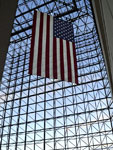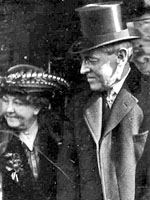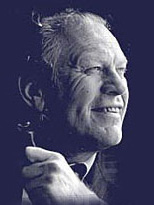Presidents in the Library

Happy (almost) Presidents Day! Have your ever thought about all of the papers a presidency must create? Emails, memoranda, schedules, notes, speeches, letters, drafts, on and on and on, an entire term (or terms) set down in a sea of potential primary sources. But how can educators access this wealth of materials?
In many cases, all you have to do is go online. Before the 20th century, presidents had ownership of their papers, and many were lost to time or split up in private collections. However, in 1939, President Franklin D. Roosevelt decided that his papers should become the property of the American people following his presidency. He donated both his papers and part of his Hyde Park estate to the government, and the first presidential library was born.
In 1955, the Presidential Libraries Act set rules for gifting the government with property and other resources to be used to establish the libraries, and in 1978, the Presidential Records Act made it official—presidential papers were government property.
Today, 13 presidential libraries house the papers of the last 13 presidents. The National Archives and Records Administration, which oversees the libraries, describes them as combination archive-museums, “bringing together in one place the documents and artifacts of a President and his administration and presenting them to the public for study and discussion without regard for political considerations or affiliation.”
Each of the libraries maintains its own website. Though the resources available on each vary greatly, almost all provide biographical information on the president and first lady, student and educator sections, and a selection of digitized photographs and documents. Some have extensive searchable databases full of documents, photos, and other primary sources! Here's a list of the libraries:
- Herbert Hoover Presidential Library, West Branch, IA — features 13 simple online exhibits and Hoover Online! Digital Archives, a collection of suggested units and lesson plans for secondary students with primary sources.
- Franklin D. Roosevelt Library, Hyde Park, NY — the first presidential library, completed in 1940. Offers five curriculum guides, an online exhibit on the art of the New Deal, and the Pare Lorentz Center, which encourages using multimedia to teach about FDR.
- Harry S. Truman Presidential Library, Independence, MO — offers a searchable lesson plan database and digitized photographs, audio clips, and political cartoons, as well as documents divided up by topic (topics include such teachable subjects as the decision to drop the atom bomb and Japanese Americans during World War II).
- Dwight D. Eisenhower Presidential Library, Abilene, KS — features a selection of online documents, grouped by topics (topics include Brown vs. Board of Education, Hawaiian statehood, McCarthyism, and others), and transcripts of oral history interviews.
- John F. Kennedy Presidential Library, Boston, MA — provides six online exhibits (including exhibits on the space program, the Cuban Missile Crisis, and desegregating the University of Mississippi), a photo gallery, major speeches, and a searchable digital archive. It also houses the Ernest Hemingway Collection.
- Lyndon B. Johnson Presidential Library, Austin, TX — features a photo archive, the presidential daily diary, selected speeches, and the subsite LBJ for Kids!
- Richard Nixon Presidential Library, Yorba Linda, CA — includes digitized documents, samples of the Nixon tapes, a photo gallery, video oral histories, four lesson plans, and online exhibits on Watergate, gifts to the head of state, and Nixon's meeting with Elvis.
- Gerald R. Ford Presidential Library, Ann Arbor, MI — features 10 simple online exhibits, as well as digitized documents and photos.
- Jimmy Carter Presidential Library, Atlanta, GA — offers selected documents and photographs, including the diary of Robert C. Ode, hostage in the Iran Hostage Crisis.
- Ronald Reagan Presidential Library, Simi Valley, CA — includes an image archive arranged by topic, and the public papers of Reagan, arranged by month and year.
- George H. W. Bush Presidential Library, College Station, TX — includes 12 lesson plans, a photo archive, and searchable public papers of his presidency.
- William J. Clinton Presidential Library, Little Rock, AR — has both virtual exhibits and a digital library in development.
- George W. Bush Presidential Library — the newest of the public libraries, it does not yet have a permanent building. Many papers from the Bush administration are not yet available to the public (papers become public five years after the end of a presidency, which can be extended up to 12 years).
Remember that many of the presidential libraries offer museum tours and activities for school groups! If your school is close to one, consider a field trip or participating in the professional development opportunities the library may offer.
Looking for resources on a pre-Hoover president? Several libraries exist outside of the official presidential library system, including the Abraham Lincoln Presidential Library and Museum, Rutherford B. Hayes Presidential Center, William McKinley Presidential Library and Museum, Woodrow Wilson Presidential Library and Museum, and the Calvin Coolidge Presidential Library and Museum. Try the Library of Congress's American Memory collections, as well, for papers that belonged to Abraham Lincoln, Thomas Jefferson, and James Madison.

